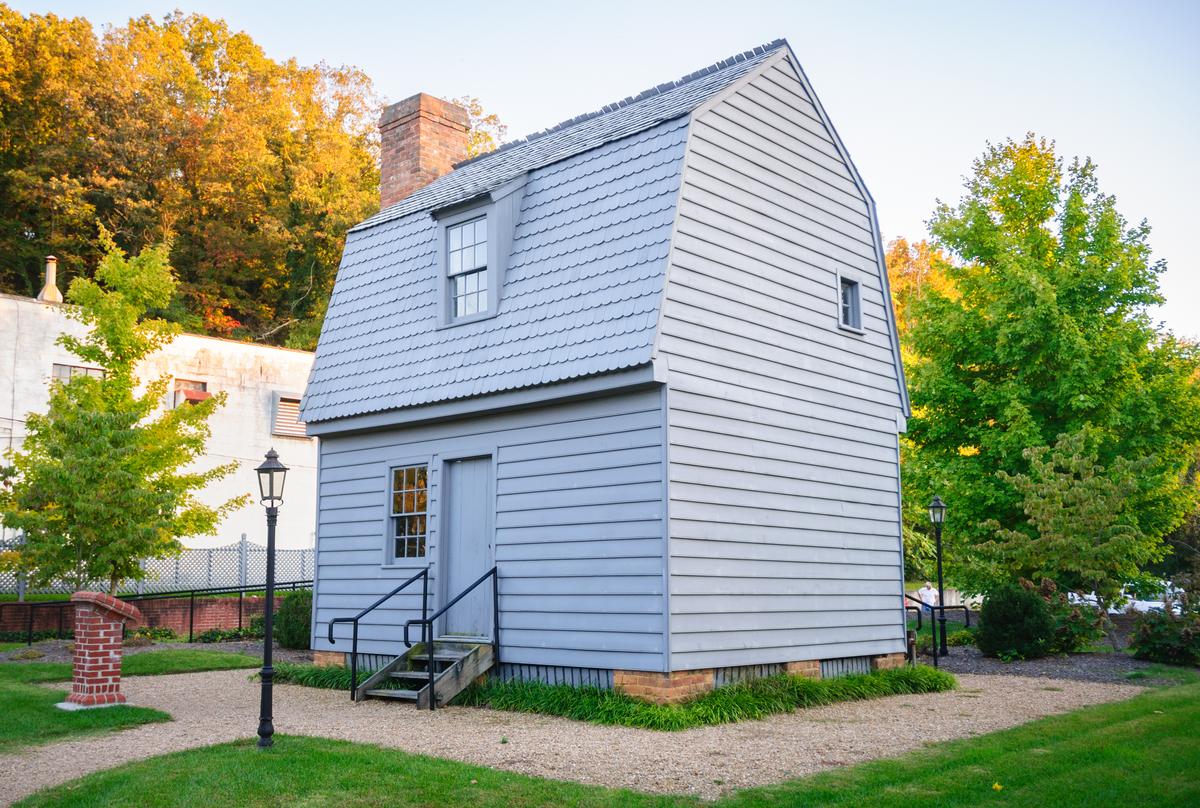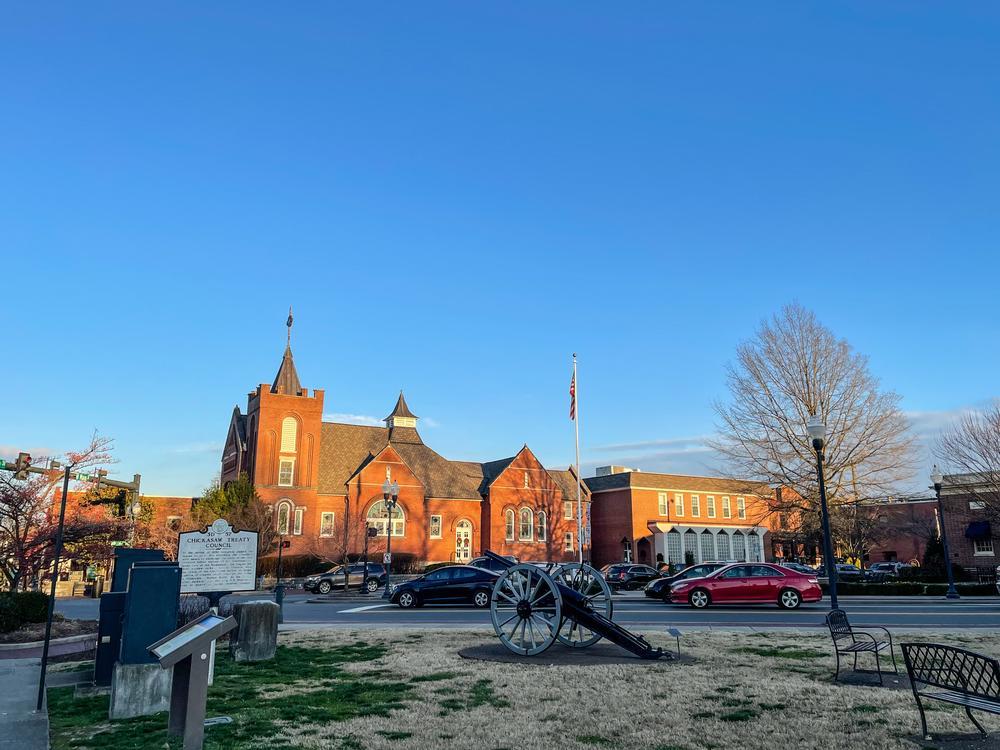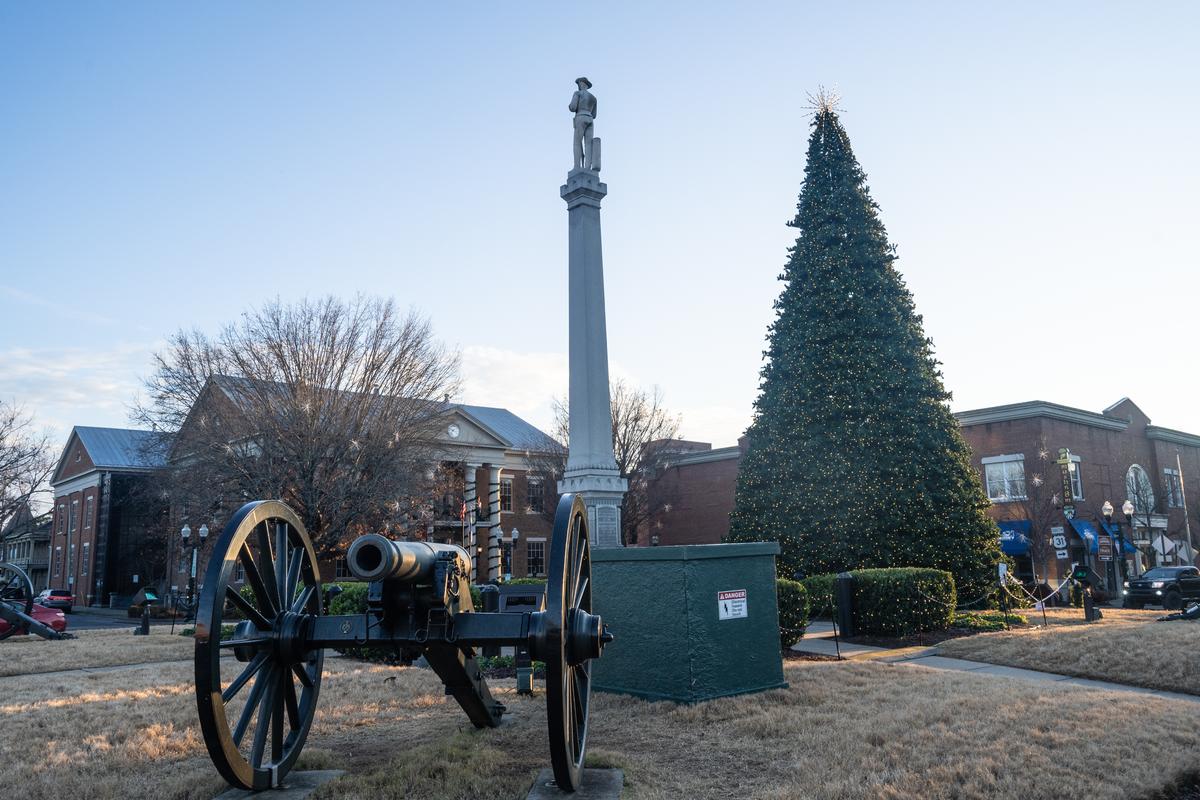Best Places to Visit in Tennessee

Searching for the best places to visit in Tennessee? Well, you are in the right place! Tennessee is a state where music, history, and natural beauty come together to create unforgettable experiences. Here are some truly unforgettable places we visited during our recent four week road trip that I hope you’ll love too.

1. Nashville
This has always been one of my favorite places to visit in Tennessee, and every trip feels like a brand-new adventure filled with vibrant energy and hidden gems. I think the coolest part is how the city blends its famous country music legacy with an exciting modern vibe.
We flew 670 miles northeast from Austin to Nashville (just under 2 hours in the air, tickets around $150 round-trip) where we started our four week road trip. We checked into The Joseph for two days, voted #1 Hotel in Nashville by Travel + Leisure readers so you can trust that it's a quality place.
One of the absolute best experiences for me was stepping into the Grand Ole Opry, just northeast of downtown. The magic of hearing live performances in such a historic venue made the night unforgettable. I still remember the joyful crowd—it felt like a dream!
Walking down Broadway, near the heart of the city, I couldn’t stop smiling at the spectacular neon lights and endless live music pouring out. It’s one of those affordable and exciting things you can do that gives you the full Nashville experience without even trying.
My favorite hidden gem turned out to be the 12South neighborhood, just a few miles south of downtown. I loved exploring its cool murals, unique boutiques, and we stopped at Frothy Monkey where we enjoyed coffee and pastries at one of their outdoor tables. The vibe there felt both local and unusual in the best way.
Another must-see was the Country Music Hall of Fame near Music Row. I thought it was fascinating to explore the exhibits—it gave me a deeper appreciation for the legends behind the songs I grew up with. For me, it’s one of the most underrated but exciting museums in the country.
- Location: In north-central Tennessee along the Cumberland River, southeast of Clarksville and north of Franklin
- Map & Directions
What I loved best:
My favorite highlight was a romantic sunset view at Love Circle, just west of Vanderbilt University


2. Sewanee Inn
This is a peaceful and romantic Southern highland escape and I think it's one of the best romantic weekend getaways in Tennessee, just an hour and 30 minutes from Nashville! I love how Sewanee has preserved its collegiate-Gothic charm and natural beauty by centering life around the University of the South’s historic campus, its cultural traditions, and its rolling Cumberland Plateau landscape rather than leaning into overdevelopment.
Located about 90 minutes from Nashville, Sewanee is known for its stately stone architecture, wooded trails, and sweeping overlooks of the Tennessee valley.
The Sewanee Inn is set right on the edge of the university’s golf course. The inn blends a warm Southern welcome with a polished, elegant style. My room for two days was airy and refined with a balcony overlooking the rolling greens. The inn has a cozy lounge and inviting common spaces.
- Location: Map & Directions
- Check prices at 3-star Sewanee Inn
What I loved best:
Waking up in the quiet stillness of the Plateau, surrounded by beauty and tradition, was truly unforgettable.

3. Things to Do in Knoxville
I thought that this city in the Smoky Mountains was one of the best places to visit in tennessee when I moved to the South. Why? First off, "Marble City" has always surprised me with its mix of natural beauty, history, and a cool downtown scene with markets, chops, cafes and restaurants.
We drove 180 miles east from Nashville to Knoxville (just under 3 hours along I-40) where we stayed at 4-star Marriott Knoxville Downtown for two days.
One of the best places I visited was Market Square in the heart of downtown, open 24 hours with street performers, cafés and restaurants. I couldn’t miss the Sunsphere at World’s Fair Park, near the Tennessee River.
For something unusual, I loved exploring the Knoxville Museum of Art, located right next to World’s Fair Park.
One of my absolute favorite moments was strolling along the Tennessee River waterfront and then grabbing dinner at Ruth's Chris Steakhouse where the flavors were spectacular.
We also took a short scenic 30-minute drive to Dean’s Restaurant & Bakery in Oak Ridge for their legendary biscuits and from-scratch desserts, a true local gem where Southern comfort meets homemade sweetness.
- Location: In eastern Tennessee along the Tennessee River, west of the Great Smoky Mountains and northeast of Oak Ridge
- Map & Directions
What I loved best:
My personal highlight was visiting Knoxville Botanical Garden and Arboretum in late May when everything was in bloom.


4. Dancing Bear Lodge
This is a rustic and romantic Smoky Mountain hideaway, just 45 minutes from Knoxville, and thought it's one of the best romantic weekend getaways in Tennessee! Why? I love how this lodge captures the quiet beauty of Townsend (“the peaceful side of the Smokies”) by focusing on nature, farm-to-table dining, and authentic Appalachian warmth rather than the bustle of more commercialized mountain towns.
Just outside the entrance to Great Smoky Mountains National Park, Dancing Bear feels like a retreat into the woods. The property is spread across rolling hills and forest, offering both seclusion and easy access to hiking, cycling, and scenic drives along the Foothills Parkway. Townsend’s slower pace makes it an ideal base for a truly restorative getaway.
I thought that staying at Dancing Bear Lodge was absolutely enchanting. The cabins and villas blend rustic log charm with upscale touches—stone fireplaces, cozy porches, and luxurious soaking tubs. Each space feels private and serene, with woodland views that shift beautifully from dawn to dusk. And the on-site Appalachian Bistro elevates the experience with locally inspired, gourmet meals.
- Location: Map & Directions
- Check prices at 3-star Dancing Bear Lodge
What I loved best:
My favorite feature has to be the harmony between comfort and wilderness. The lodge creates a uniquely romantic mountain retreat. Waking up in such a tranquil, wooded setting makes it feel like the Smokies are all your own.

5. What to Do in Greeneville, Tennessee
This city in July, felt like one of the most underrated gems I’ve ever explored. Tucked away in the foothills of the Appalachians, this historic town combines small-town charm, fascinating history, and peaceful mountain scenery in a way that makes every visit feel special.
It was about a little over an hour's drive northeast from Knoxville to Greeneville, nicknamed "Titletown," and checked into 4-star General Morgan Inn for two days.
One of my favorite places was the Andrew Johnson National Historic Site right near downtown. I loved exploring downtown Greeneville itself, with its brick-lined streets, unique boutiques, and cozy cafés.
Another spectacular highlight was the Niswonger Performing Arts Center, located just east of downtown. I was surprised at how many amazing shows and concerts they bring to this small town.
For outdoor fun, I thought Hardin Park and the nearby Nolichucky River were exceptional spots. Whether it was a family picnic, a peaceful walk, or even rafting nearby, the natural beauty made me feel connected and refreshed. It was pure magic being surrounded by such scenery.
- Location: In northeastern Tennessee in the foothills of the Appalachian Mountains, southwest of Johnson City and north of Newport
- Map & Directions
What I loved best:
My personal highlight was a romantic dinner I had with Chris at Brumley's Restaurant and Lounge sampling great Modern Appalachian Cuisine right at the inn where we stayed.

6. Smyrna
Nestled just southeast of Nashville, this place offers a warm Southern charm mixed with modern convenience, and it quickly became one of my favorite day trips from Nashville. While not as old-world picturesque as Petoskey’s Victorian streets, Smyrna’s appeal lies in its sense of community, rich Civil War history, and a peaceful small-town atmosphere surrounded by Tennessee’s rolling hills.
A scenic 30-minute drive from downtown Nashville brings you to this friendly town, where we spent an easygoing weekend exploring local gems. I wandered through the serene Sharp Springs Park, its trails weaving through woods and open fields that end along the calm waters of Stewarts Creek.
Downtown, I stopped for a hearty Southern lunch at South City Kitchen Vinings, then enjoyed a late afternoon coffee and my son had an ice cream at Candy Cloud - Smyrna, a local favorite.
The next morning, I visited the Sam Davis Home, a remarkably preserved antebellum plantation and museum that tells the poignant story of Tennessee’s “Boy Hero of the Confederacy.” It was both haunting and moving, with oak trees shading the grounds and history quietly echoing through the farmhouse walls.
For my five day stay, I chose the 3-star Hilton Garden Inn Smyrna (about $152/night), where we stayed in a comfortable room with two Queen beds, and from there we had easy access to nearby attractions. I loved that prices were much more affordable than tourist-heavy Nashville, making it a great base for exploring Middle Tennessee without breaking the bank.
- Location: In central Tennessee southeast of Nashville, north of Murfreesboro, and along the west fork of the Stones River
- Map & Directions
What I loved best:
Walking on the nature trails and boardwalks of Sharp Springs Park was my personal highlight.

7. Murfreesboro
This place, just 35 miles southeast of Nashville, has always been one of my favorite places to visit and explore in Tennessee. Why? First off, it’s filled with a mix of history, vibrant culture, and some really cool hidden gems. Your visit feels like the perfect blend of an affordable weekend getaway and an exciting small-city adventure.
We drove 34 miles southeast from Nashville to Murfreesboro (about 40 minutes on I-24) and stayed at 3-star Murfreesboro Central Hotel for two days.
One of the absolute best places I visited was the Stones River National Battlefield, located just north of downtown. Walking the historic trails and learning about the Civil War made for such a meaningful and fascinating experience I would do it again in a heartbeat!
I loved spending time at Cannonsburgh Village, right near downtown. This unusual and unique re-creation of a 19th-century pioneer town was one of the most underrated attractions in Murfreesboro. The blacksmith shop, old schoolhouse, and cool antiques made it a joyful trip back in time.
Another highlight for me was the Center for the Arts on College Street. Catching a community theater performance there was an exciting and brilliant idea—it really showed off Murfreesboro’s vibrant local talent. The atmosphere felt welcoming and inspiring.
For outdoor fun, I thought the Greenway system was spectacular and my personal highlight here. We spent 2 hours walking along the Stones River Greenway, and the peaceful scenery mixed with wildlife spotting made it one of my favorite parts of the trip. It’s perfect for families or a romantic walk.
- Location: In central Tennessee southeast of Nashville, north of Shelbyville, and along the West Fork of the Stones River
- Map & Directions
What I loved best:
Dinner at The Goat Murfreesboro. The vibe was vibrant, the food was amazing, and the friendly atmosphere reminded me why Murfreesboro is such a gem. It’s not just a town near Nashville...it’s an exciting destination all on its own.


8. Places to Visit in Memphis
This has always been one of the most exciting and soulful cities I’ve visited in Tennessee, and every time I go, I discover a new hidden gem that makes me fall in love with it all over again. I think the coolest thing is how the city mixes history, music, and food into one unforgettable getaway.
We drove west 210 miles from Nashville to Memphis (about 3 hours along I-40) and checked into The Rambler for two days, just steps from National Civil Rights Museum at the Lorraine Motel which we loved exploring. It’s powerful, emotional, and one of the most meaningful museums I’ve ever experienced. For me, this was one of the absolute best ways to understand the deeper story of Memphis.
One of my favorite places was Beale Street, right near downtown. The vibrant neon lights, live blues bands, and joyful atmosphere made it one of the best nights out I’ve ever had. I could feel the magic of the city’s music legacy in every step I took. Stop for a Southern meal at Blues City Cafe for lunch or dinner..their soul food is insanely good (you heard it here first!).
Visiting Graceland, just south of downtown, was a dream come true. Walking through Elvis Presley’s iconic home gave me chills—it’s an amazing, unusual, and truly unique place that every music lover should see at least once.
Food in Memphis was another highlight. Eating slow-cooked barbecue ribs at Charlie Vergos' Rendezvous downtown felt like a brilliant idea at the time—and it turned out to be one of my favorite meals ever. The flavors were spectacular!
- Location: In southwestern Tennessee along the Mississippi River, north of the Mississippi state line and south of West Memphis, Arkansas
- Map & Directions
What I loved best:
Watching the sunset over the Mississippi River at Tom Lee Park was my personal highlight.



9. Things to See and Do in Franklin
This city, just about 20 miles south of Nashville, has to be one of my favorite small-town gems in the state. Every time I visit, I feel like I’ve stepped into a blend of history, charm, and modern vibrancy that makes for the perfect weekend getaway.
It was just a 21-mile drive south from Nashville to Franklin (about 30 minutes on I-65) where we stayed at The 4-star Harpeth Franklin Downtown for two days.
Walking down Main Street in downtown Franklin is a joyful experience. The Victorian-style buildings, boutique shops, and cozy cafés create such a unique and romantic atmosphere that I can’t help but linger. It’s honestly one of the coolest small-town streets I’ve ever explored.
One of the absolute best things I did was tour the Carnton House, just a few minutes outside downtown. The history tied to the Civil War was both moving and fascinating, and the grounds themselves felt peaceful and beautiful. For me, this was an underrated highlight of Franklin.
I also loved stopping by The Factory at Franklin, near Liberty Pike. It’s such an exciting spot filled with local artisan shops, interesting art galleries, and delicious food stalls. I thought it was an amazing example of how Franklin has transformed its history into something modern and vibrant.
- Location: In central Tennessee south of Nashville, north of Spring Hill, and along the Harpeth River
- Map & Directions
What I loved best:
My favorite hidden gem was definitely Arrington Vineyards, about 15 minutes east of town. Sitting on the hillside with a glass of wine, listening to live music, and watching the sunset felt like pure magic—whether for a romantic date or a fun family picnic.



10. Gatlinburg
This city felt like a dream to me this month...a mountain town filled with magic, fun, and some of the most spectacular views in the state. I thought that it was one of the absolute best places to visit in TN! Nestled right at the entrance of Great Smoky Mountains National Park, it’s the perfect place for both adventure and a cozy getaway.
It was just a 35-mile drive southeast from Knoxville to Gatlinburg (about an hour along US-441) where we stayed at 4-star Margaritaville Resort Gatlinburg two days.
One of my favorite things to do was wander along the Parkway downtown. The vibrant strip is full of unusual attractions, cool shops, and delicious eateries. It felt joyful just strolling and taking in the lively atmosphere.
The absolute best experience for me was riding the Gatlinburg Tram, which starts right near downtown. Floating high above the city and seeing the mountain views was both exciting and romantic—it’s one of those things you can’t forget.
I also loved visiting Anakeesta, a unique mountaintop adventure park just minutes from the Parkway. The tree canopy walks, mountain coasters, and spectacular overlooks made it one of my favorite hidden gems in Gatlinburg. The vibe there was so vibrant and family-friendly.
For something magical, I explored Ripley’s Aquarium of the Smokies downtown. Walking through the underwater tunnel with sharks gliding above me was such a cool and unusual experience. It’s definitely one of the best aquariums I’ve ever visited.
- Location: In eastern Tennessee at the northern edge of Great Smoky Mountains National Park, south of Pigeon Forge and north of the Smokies’ high peaks
- Map & Directions
What I loved best:
The most exciting part was stepping into Great Smoky Mountains National Park just minutes away. Hiking to waterfalls and scenic overlooks gave me a peaceful yet thrilling connection with nature. Gatlinburg, to me, is the ultimate blend of fun attractions and breathtaking natural beauty.



11. Chattanooga
This has to be one of the coolest and most underrated cities in Tennessee, and every time I visit, I’m blown away by how much there is to do. Nestled along the Tennessee River and surrounded by mountains, it’s the perfect mix of outdoor adventure and vibrant city life.
We drove 135 miles southeast from Nashville to Chattanooga (about 2 hours along I-24) and stayed at The Chattanoogan Hotel for two days.
One of my favorite places was the Tennessee Aquarium, right near the riverfront downtown. It’s absolutely one of the best aquariums I’ve ever visited, and walking through its unique freshwater exhibits felt like stepping into another world. It’s joyful, educational, and perfect for families.
I thought the Walnut Street Bridge was spectacular. Strolling across one of the longest pedestrian bridges in the world while watching the sunset over the Tennessee River was an unforgettable and romantic experience. The views were pure magic!
For something exciting and unusual, I explored Ruby Falls, located inside Lookout Mountain just a few miles southwest of the city. Hiking through the caves and seeing the underground waterfall was one of the most unique adventures I’ve ever had—it honestly felt like a dream.
Dinner was at Boathouse where the patio overlooked the Tennessee River, and with the breeze brushing across my table...
- Location: In southeastern Tennessee along the Tennessee River, near the Georgia border, northeast of Lookout Mountain and southwest of Cleveland
- Map & Directions
What I loved best:
Riding the Incline Railway up Lookout Mountain was my favorite. Riding the steepest passenger railway in the world was thrilling, and the panoramic views at the top were the absolute best. It’s one of those hidden gems you can’t miss.
For me, Chattanooga is one of the best places to visit in Tennessee because it's full of exciting attractions and restaurants!




Booking Checklist
1. Book Your Flight - I use Expedia because I like their mobile app with my itinerary. They've helped me re-book flights on many occasions. Once you reach their Gold tier, support is especially good.
2. Book Your Hotel - I use Booking.com or Expedia, depending on my destination.
3. Book Your Rental Car - I use Expedia.
4. Book your tours on Viator or Get Your Guide.
5. If you are planning to visit more than three national parks in the next 12 months, buy the America the Beautiful Pass.
